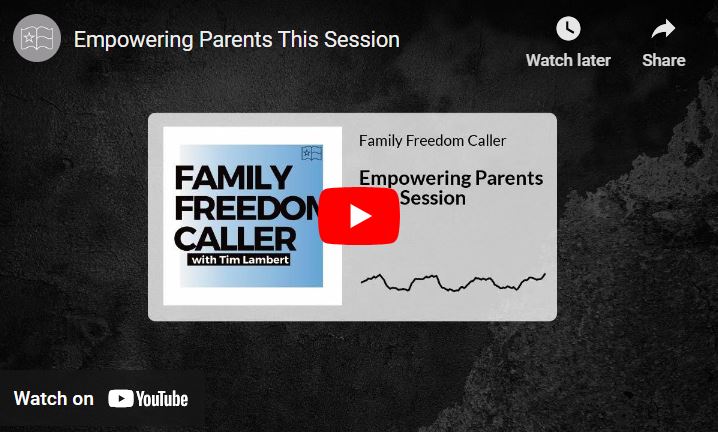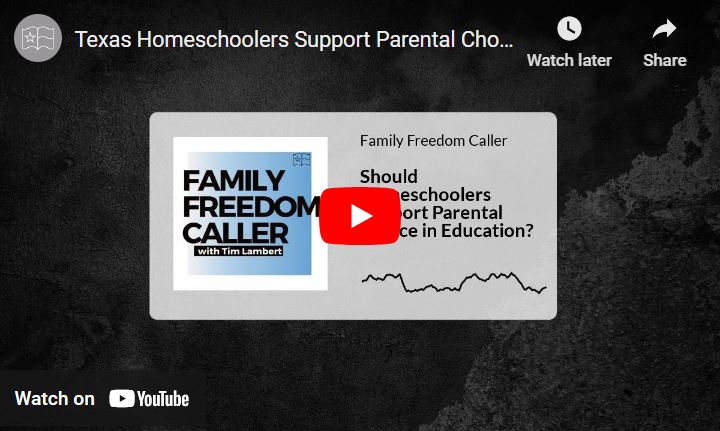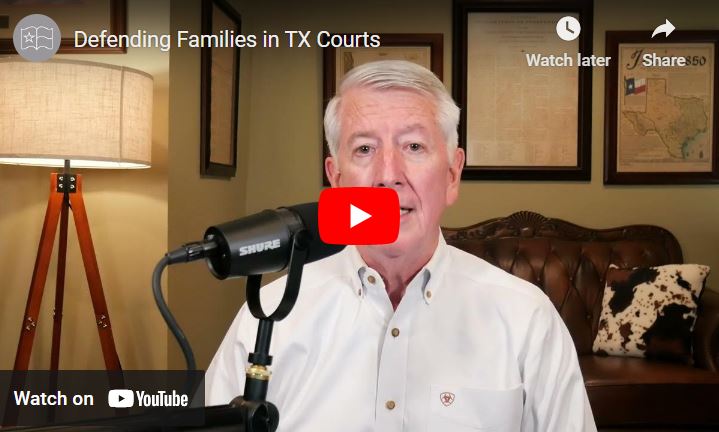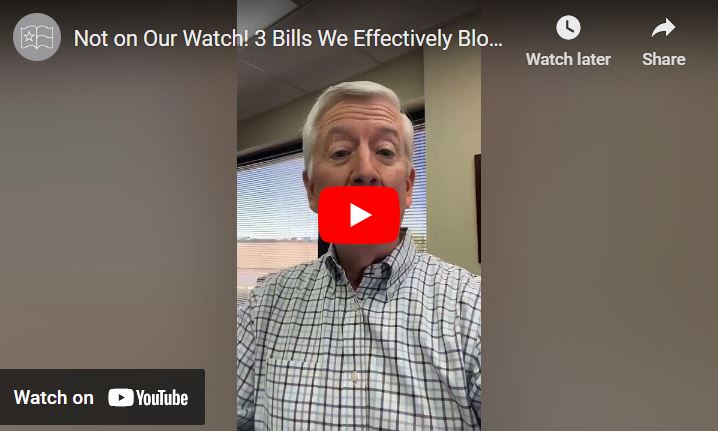Since early January, the THSC policy team stood guard over the 2019 Texas legislative session in Austin. Here is the 2019 legislative summary for Texas families!
The THSC Watchmen spent six months in Austin reviewing legislation as well as analyzing, supporting, opposing, amending and even killing various bills based on whether they supported or threatened family freedoms and homeschooling.
As always, THSC focused its efforts on bills that affected the right of families to raise their children. THSC believes that defending this fundamental right for all parents is essential to the defense of homeschooling. For this reason, the team often became involved in bills that did not specifically relate to homeschooling because the bill had a direct effect on the right of families to raise their children.
This legislative session was packed, and below is the detailed inside scoop on what your advocates did during the 2019 legislative session!
Bills THSC Supported in the 2019 Legislative Session
1. Family Unity Act (HB 2756 by Jeff Leach/SB 2365 by Bryan Hughes)
Would have protected the right of families to raise their children.
- HB 2756 by Jeff Leach: This bill’s purpose was to update Texas law to reflect the last 100 years of United States Supreme Court case law on the issue of parental rights. It would have provided much-needed clarity on the fundamental constitutional right of parents to raise their children.
- The bill received a hearing in the Juvenile Justice and Family Issues Committee in the Texas House of Representatives. However, the bill failed to receive an affirmative vote when it was called up: four nays, two yeas and one present. Two members who were confirmed yea votes were absent. The House bill died here due to opposition from the Texas Family Law Foundation.
- SB 2365 by Bryan Hughes: In early May the Senate companion to HB 2756 received a public hearing in the State Affairs Committee. The bill was not brought up for a vote in committee.
2. Child Trauma Prevention Act (HB 3331 by James Frank/SB 2091 by Bryan Hughes)
Would have protected the rights of families in the Child Protective Services (CPS) system.
- The Child Trauma Prevention Act would have implemented specific due process protections within the Texas CPS system, thereby protecting children and families from the trauma caused by unnecessary child removals.
- HB 3331: The bill passed the House committee with no witnesses testifying against it. However, the bill died in the House Calendars Committee because an unknown member of the committee stalled the bill until it died on a deadline.
- SB 2091: The Texas Senate declined to move bills early in the session if they had House companions. The Senate’s plan was to wait for the House companions to come over to the Senate. Because HB 3331 died unexpectedly in the House, SB 2091 would have needed to move very quickly through the Senate in order to pass. Unfortunately, the bill did not move fast enough so it died on a deadline.
3. UIL Equal Access/Tim Tebow Bill (HB 1324 by James Frank/SB 718 by Pat Fallon)
Would have allowed homeschoolers equal access to extracurricular activities in public schools.
- HB 1324: This bill would allow Texas homeschoolers to participate in UIL activities at their local public schools such as sports, speech and debate, choir, band, etc.
- After receiving a public hearing on April 4 in the Texas House Public Education Committee, the bill stalled due to heavy opposition from the Texas High School Coaches Association. Significant amounts of money were paid to HillCo Partners, a well-known and well-connected lobbying firm in Texas. This played a significant role in slowing down the bill. Their opposition flipped several yes votes on the committee to no votes. The bill died in committee as a result.
- SB 718: The UIL bill never received a public hearing in the Senate due to its insistence on waiting for House bills to come over, rather than moving the Senate bills. The bill died in the Senate without a hearing.
4. HB 1332 (Died in Calendars)
Would have prevented cities from punishing children for being out during school hours.
Authored by State Rep. Celia Israel, HB 1332 would have eliminated juvenile curfews in municipalities. THSC supported this bill because of the disproportionate effect of curfews on homeschoolers who have very flexible schedules and are often out when other children may still be in school.
THSC Watchmen Matthew Lawson testified in favor of the bill in the House Juvenile Justice and Family Issues Committee.
5. HB 4188 (Died in Committee)
Would require that CPS and police get parental consent before interviewing children.
Authored by State Rep. Mayes Middleton, THSC supported HB 4188 because it would have required that police and CPS obtain parental consent prior to interviewing a child while the child is not at home. THSC policy team member Meagan Corser testified in favor of the bill in the House Human Services Committee. You may watch her testimony here!
6. HB 4189 (Died in Committee)
Would protect professionals for not reporting “abuse or neglect” when the professional has no actual knowledge of any wrongdoing by the family.
Authored by State Rep. Mayes Middleton, HB 4189 would have protected professionals from losing their licenses when they have no actual knowledge of abuse or neglect and therefore had not reported anything. THSC policy team member Meagan Corser testified in favor of the bill in the House Human Services Committee. You may watch her testimony here!
In addition to these bills, THSC worked extensively to amend several bills that would have worked against your rights as parents and homeschoolers.
Bills We Fixed
THSC ensured that each of these bills was fixed to protect the right of parents to raise their children. This does not mean that THSC supported the bill, only that the parental rights concerns were addressed.
1. HB 366 (Died in Committee)
Would have allowed the teaching of sensitive subjects to children without parental consent.
This bill, carried by State Rep. Mary Gonzalez, would have required a new class covering “healthy relationships” in public schools. This term was very loosely defined but was generally aimed toward preventing dating violence and promoting age appropriate healthy relationships (in dating, friends, family, work, etc).
- THSC opposed HB 366 because it did not include requirements for parental notification or consent and because it did not provide any way for parents to participate in the creation of the curricula (as is done for sex education curricula). THSC worked with Rep. Gonzalez’s office to add these additional requirements to the bill. THSC Watchmen Mason Prewitt testified on this bill and the amendments that we suggested. You may watch that hearing here. The changes made by THSC ensured that:
- Parents would receive a paper notification of the new class requirement prior to the start of the new school year.
- Parents would be given the opportunity to withdraw their children from the class without fear of consequence from the school district. We also provided an avenue for appeal (should any complaints or misgivings need to be voiced).
- Parents would be able to review the curriculum and even participate in its creation at the local level.
- Ultimately, the bill failed to pass.
2. HB 548 (Passed, Became Law)
Would have required that school districts track and report homeschool students.
House Bill 548 was a great example of a bill that unintentionally could have harmed homeschool families. It would have required school districts to report the number of truant students in their district and initially listed multiple criteria that a student would have to meet in order to be included in the district’s report.
The school district would have to report the number of students in four categories: 1) Those required to enroll in the public school (under section 25.085 of the Texas Education Code), 2) those who fail to enroll,3) those who fail to do so for 10 days or more within a six-month period, and 4) all students for whom the district has issued a truancy prevention measure.
We quickly realized that to record the number of students who failed to enroll in public school, the district would have to make an entirely new list of all private school and homeschool students in the district and compare that data to the students it knows to be truant.
THSC’s legislative team in Austin met with the office of HB 548’s author, State Rep. Terry Canales, and addressed our concerns by proposing an amendment.
The amendment made two major changes to HB 548:
- It removed the broadly-worded requirement that school districts report the number of students who are required to enroll and fail to do so.
- It clarified that students who are exempt from compulsory attendance (all private school and homeschool students) are not included in the report.
3. HB 1115 (Died in Calendars)
Would have allowed fit parents to be unnecessarily denied possession of their children in certain circumstances.
HB 1115 was authored by State Rep. James White. This bill would have allowed any adult arrested with a child in his or her possession to name any person to whom the peace officer could release the child. Prior to releasing the child, the officer was required to conduct the following tasks:
- Pull driving records;
- Conduct an extensive background check, including sex offender registries;
- Contact the Department of Family Protective Services (DFPS) to cross-reference the person’s files with their databases;
- Verify that the person is 18 years of age or older;
- Locate the individual;
- Release the child;
- Provide information on the child’s placement and whereabouts to the arrested adult regardless of his or her relation to the child.
THSC saw a few issues with this approach. First of all, the arrested adult should not have sole authority to determine the child’s placement if that adult is not the child’s parent or guardian.
Second, requiring the child’s caretaker to be over 18 alienates minor parents. Texas has a growing number of parents who are under 18, and they should not be prevented from receiving their children in this type of situation simply because of their age.
Finally, information on a child’s whereabouts and placement should not be freely given to arrested individuals unless they are the child’s parent or guardian.
THSC was able to make the following amendments to the bill:
- Require that prior to involving DFPS, the peace officer attempt to locate the child’s parent or guardian and release the child to him or her if found;
- Exempt minor parents from the age requirement;
- Limit the involvement of DFPS when a child is released to his or her parent or guardian; and
- Withhold information on the child’s whereabouts from the arrested person unless that person is the child’s parent or guardian.
Ultimately, although these important changes were made, the bill failed to pass.
4. HB 1318 (Died in the Senate)
Would have allowed children to be admitted to a mental health facility without parental consent.
Authored by State Rep. Joseph Moody, HB 1318 would have allowed any adult the ability to place a child in a mental health facility. It went as far as to allow a peace officer to take a child of any age and place him or her in the custody of a mental health facility on what THSC considered to be extremely loose grounds.
Because of this, THSC opposed the bill and worked with Rep. Moody’s office to amend the bill to a point where THSC could be neutral. We worked with the bill’s author and other stakeholders to make the following amendments:
- Allow only certain relatives to admit the child to a mental health facility;
- Require extensive due process protections to be met before the child could be admitted to a mental health facility;
- Require that parents have complete authority and veto power over whether the child is admitted to the facility.
5. SB 10 (Died in the House, later amended onto another bill)
Would have allowed children to be given certain mental health services without parental consent.
Authored by State Sen. Jane Nelson, SB 10 was a school mental health bill that would create a consortium of groups to provide services to school districts. These methods of treatment would have circumvented existing parental notification requirements.
THSC worked to make the following amendments to the bill:
-
- Parents/guardians must be notified prior to any medical examination or evaluation conducted by a school district employee or any other medical professional.
- Parents/guardians must consent to any treatment that may be prescribed following a medical examination or evaluation.
This bill died in the House. However, sections of the bill were amended onto SB 11, which is discussed below.
6. SB 11 (Passed, Became Law)
Would have allowed children to be given certain mental health services without parental consent.
Authored by State Sen. Larry Taylor, SB 11 is a school safety and child mental health bill written to address a variety of mental health issues that schools have been facing across Texas.
THSC had several concerns because many provisions did not appear to explicitly require a parent or guardian’s consent prior to a mental health procedure, evaluation or screening.
THSC worked to make the following amendments to the bill:
-
- Parent/guardians must be notified prior to the performance of any mental health treatment or evaluation by a school district via a contractor or school employee.
- Parent/guardians must provide consent in order for the school district or contractor to perform any such mental health treatment or evaluation.
These changes were successfully made and the bill was passed and signed into law by Governor Abbott.
Bills We Opposed
1. HB 575 (Died in House Calendars Committee)
Would have allowed estranged in-laws to remove a family’s children without any accusations of abuse or neglect.
HB 575 was authored by Rep. Harold Dutton. This bill has been filed every legislative session since 2013. The bill would make it easier for estranged in-laws to obtain access to and possession of a parent’s children over the parent’s objections.
The sentiment promoted to justify this bill is that certain non-parents who feel like they have a relationship with a child should be able to obtain court-ordered possession of that child, the parent’s opinion notwithstanding.
This idea quickly turns horrendous when estranged in-laws disagree with basic, legitimate parenting decisions made by a parent and resort to the courts to force their opinion on the parent.
The current law applies only to single parents, allowing the in-laws of that single parent to sue the family for possession of the child. Under current law, families in Texas have already been torn apart and have lost their children for years without even an accusation of abuse or neglect. HB 575 would have expanded current law, allowing any family in Texas to be sued by their in-laws and have their children removed.
At THSC, we believe that the fundamental right of parents to raise their children should not depend on how much money you have to defend yourself in court. Furthermore, a court should be allowed to require expert testimony when considering the extraordinary action of forcing a parent to give possession of their child to someone else.
THSC and the Texas homeschool community lobbied heavily against the bill, bringing 131 people to the hearing to register against it. This opposition resulted in its timely death in the Calendars Committee.
We all owe a special thanks to everyone who came to testify against the bill and who called offices expressing their opposition! Homeschoolers have protected Texas families from this dangerous legislation for the last four legislative sessions in a row. We will continue to do so.
The 2019 Texas Legislature’s Impact on Families
Although Texas homeschoolers and THSC’s policy team were able to hold the line in protecting family rights this legislative session, the Texas legislature also failed to pass any reforms to help protect the right of families to raise their children.
THSC’s policy team will be working extensively during the interim to prepare for the 2021 legislative session to ensure that the legislature prioritizes much-needed reforms for Texas families.
We believe in empowering parents to raise and educate the next generation of leaders, which is why THSC is Keeping Texas Families Free. Consider making a donation to support our critical work for families today!
Since early January, the THSC policy team stood guard over the 2019 Texas legislative session in Austin. Here is the 2019 legislative summary for Texas families!
The THSC Watchmen spent six months in Austin reviewing legislation as well as analyzing, supporting, opposing, amending and even killing various bills based on whether they supported or threatened family freedoms and homeschooling.
As always, THSC focused its efforts on bills that affected the right of families to raise their children. THSC believes that defending this fundamental right for all parents is essential to the defense of homeschooling. For this reason, the team often became involved in bills that did not specifically relate to homeschooling because the bill had a direct effect on the right of families to raise their children.
This legislative session was packed, and below is the detailed inside scoop on what your advocates did during the 2019 legislative session!
Bills THSC Supported in the 2019 Legislative Session
1. Family Unity Act (HB 2756 by Jeff Leach/SB 2365 by Bryan Hughes)
Would have protected the right of families to raise their children.
- HB 2756 by Jeff Leach: This bill’s purpose was to update Texas law to reflect the last 100 years of United States Supreme Court case law on the issue of parental rights. It would have provided much-needed clarity on the fundamental constitutional right of parents to raise their children.
- The bill received a hearing in the Juvenile Justice and Family Issues Committee in the Texas House of Representatives. However, the bill failed to receive an affirmative vote when it was called up: four nays, two yeas and one present. Two members who were confirmed yea votes were absent. The House bill died here due to opposition from the Texas Family Law Foundation.
- SB 2365 by Bryan Hughes: In early May the Senate companion to HB 2756 received a public hearing in the State Affairs Committee. The bill was not brought up for a vote in committee.
2. Child Trauma Prevention Act (HB 3331 by James Frank/SB 2091 by Bryan Hughes)
Would have protected the rights of families in the Child Protective Services (CPS) system.
- The Child Trauma Prevention Act would have implemented specific due process protections within the Texas CPS system, thereby protecting children and families from the trauma caused by unnecessary child removals.
- HB 3331: The bill passed the House committee with no witnesses testifying against it. However, the bill died in the House Calendars Committee because an unknown member of the committee stalled the bill until it died on a deadline.
- SB 2091: The Texas Senate declined to move bills early in the session if they had House companions. The Senate’s plan was to wait for the House companions to come over to the Senate. Because HB 3331 died unexpectedly in the House, SB 2091 would have needed to move very quickly through the Senate in order to pass. Unfortunately, the bill did not move fast enough so it died on a deadline.
3. UIL Equal Access/Tim Tebow Bill (HB 1324 by James Frank/SB 718 by Pat Fallon)
Would have allowed homeschoolers equal access to extracurricular activities in public schools.
- HB 1324: This bill would allow Texas homeschoolers to participate in UIL activities at their local public schools such as sports, speech and debate, choir, band, etc.
- After receiving a public hearing on April 4 in the Texas House Public Education Committee, the bill stalled due to heavy opposition from the Texas High School Coaches Association. Significant amounts of money were paid to HillCo Partners, a well-known and well-connected lobbying firm in Texas. This played a significant role in slowing down the bill. Their opposition flipped several yes votes on the committee to no votes. The bill died in committee as a result.
- SB 718: The UIL bill never received a public hearing in the Senate due to its insistence on waiting for House bills to come over, rather than moving the Senate bills. The bill died in the Senate without a hearing.
4. HB 1332 (Died in Calendars)
Would have prevented cities from punishing children for being out during school hours.
Authored by State Rep. Celia Israel, HB 1332 would have eliminated juvenile curfews in municipalities. THSC supported this bill because of the disproportionate effect of curfews on homeschoolers who have very flexible schedules and are often out when other children may still be in school.
THSC Watchmen Matthew Lawson testified in favor of the bill in the House Juvenile Justice and Family Issues Committee.
5. HB 4188 (Died in Committee)
Would require that CPS and police get parental consent before interviewing children.
Authored by State Rep. Mayes Middleton, THSC supported HB 4188 because it would have required that police and CPS obtain parental consent prior to interviewing a child while the child is not at home. THSC policy team member Meagan Corser testified in favor of the bill in the House Human Services Committee. You may watch her testimony here!
6. HB 4189 (Died in Committee)
Would protect professionals for not reporting “abuse or neglect” when the professional has no actual knowledge of any wrongdoing by the family.
Authored by State Rep. Mayes Middleton, HB 4189 would have protected professionals from losing their licenses when they have no actual knowledge of abuse or neglect and therefore had not reported anything. THSC policy team member Meagan Corser testified in favor of the bill in the House Human Services Committee. You may watch her testimony here!
In addition to these bills, THSC worked extensively to amend several bills that would have worked against your rights as parents and homeschoolers.
Bills We Fixed
THSC ensured that each of these bills was fixed to protect the right of parents to raise their children. This does not mean that THSC supported the bill, only that the parental rights concerns were addressed.
1. HB 366 (Died in Committee)
Would have allowed the teaching of sensitive subjects to children without parental consent.
This bill, carried by State Rep. Mary Gonzalez, would have required a new class covering “healthy relationships” in public schools. This term was very loosely defined but was generally aimed toward preventing dating violence and promoting age appropriate healthy relationships (in dating, friends, family, work, etc).
- THSC opposed HB 366 because it did not include requirements for parental notification or consent and because it did not provide any way for parents to participate in the creation of the curricula (as is done for sex education curricula). THSC worked with Rep. Gonzalez’s office to add these additional requirements to the bill. THSC Watchmen Mason Prewitt testified on this bill and the amendments that we suggested. You may watch that hearing here. The changes made by THSC ensured that:
- Parents would receive a paper notification of the new class requirement prior to the start of the new school year.
- Parents would be given the opportunity to withdraw their children from the class without fear of consequence from the school district. We also provided an avenue for appeal (should any complaints or misgivings need to be voiced).
- Parents would be able to review the curriculum and even participate in its creation at the local level.
- Ultimately, the bill failed to pass.
2. HB 548 (Passed, Became Law)
Would have required that school districts track and report homeschool students.
House Bill 548 was a great example of a bill that unintentionally could have harmed homeschool families. It would have required school districts to report the number of truant students in their district and initially listed multiple criteria that a student would have to meet in order to be included in the district’s report.
The school district would have to report the number of students in four categories: 1) Those required to enroll in the public school (under section 25.085 of the Texas Education Code), 2) those who fail to enroll,3) those who fail to do so for 10 days or more within a six-month period, and 4) all students for whom the district has issued a truancy prevention measure.
We quickly realized that to record the number of students who failed to enroll in public school, the district would have to make an entirely new list of all private school and homeschool students in the district and compare that data to the students it knows to be truant.
THSC’s legislative team in Austin met with the office of HB 548’s author, State Rep. Terry Canales, and addressed our concerns by proposing an amendment.
The amendment made two major changes to HB 548:
- It removed the broadly-worded requirement that school districts report the number of students who are required to enroll and fail to do so.
- It clarified that students who are exempt from compulsory attendance (all private school and homeschool students) are not included in the report.
3. HB 1115 (Died in Calendars)
Would have allowed fit parents to be unnecessarily denied possession of their children in certain circumstances.
HB 1115 was authored by State Rep. James White. This bill would have allowed any adult arrested with a child in his or her possession to name any person to whom the peace officer could release the child. Prior to releasing the child, the officer was required to conduct the following tasks:
- Pull driving records;
- Conduct an extensive background check, including sex offender registries;
- Contact the Department of Family Protective Services (DFPS) to cross-reference the person’s files with their databases;
- Verify that the person is 18 years of age or older;
- Locate the individual;
- Release the child;
- Provide information on the child’s placement and whereabouts to the arrested adult regardless of his or her relation to the child.
THSC saw a few issues with this approach. First of all, the arrested adult should not have sole authority to determine the child’s placement if that adult is not the child’s parent or guardian.
Second, requiring the child’s caretaker to be over 18 alienates minor parents. Texas has a growing number of parents who are under 18, and they should not be prevented from receiving their children in this type of situation simply because of their age.
Finally, information on a child’s whereabouts and placement should not be freely given to arrested individuals unless they are the child’s parent or guardian.
THSC was able to make the following amendments to the bill:
- Require that prior to involving DFPS, the peace officer attempt to locate the child’s parent or guardian and release the child to him or her if found;
- Exempt minor parents from the age requirement;
- Limit the involvement of DFPS when a child is released to his or her parent or guardian; and
- Withhold information on the child’s whereabouts from the arrested person unless that person is the child’s parent or guardian.
Ultimately, although these important changes were made, the bill failed to pass.
4. HB 1318 (Died in the Senate)
Would have allowed children to be admitted to a mental health facility without parental consent.
Authored by State Rep. Joseph Moody, HB 1318 would have allowed any adult the ability to place a child in a mental health facility. It went as far as to allow a peace officer to take a child of any age and place him or her in the custody of a mental health facility on what THSC considered to be extremely loose grounds.
Because of this, THSC opposed the bill and worked with Rep. Moody’s office to amend the bill to a point where THSC could be neutral. We worked with the bill’s author and other stakeholders to make the following amendments:
- Allow only certain relatives to admit the child to a mental health facility;
- Require extensive due process protections to be met before the child could be admitted to a mental health facility;
- Require that parents have complete authority and veto power over whether the child is admitted to the facility.
5. SB 10 (Died in the House, later amended onto another bill)
Would have allowed children to be given certain mental health services without parental consent.
Authored by State Sen. Jane Nelson, SB 10 was a school mental health bill that would create a consortium of groups to provide services to school districts. These methods of treatment would have circumvented existing parental notification requirements.
THSC worked to make the following amendments to the bill:
-
- Parents/guardians must be notified prior to any medical examination or evaluation conducted by a school district employee or any other medical professional.
- Parents/guardians must consent to any treatment that may be prescribed following a medical examination or evaluation.
This bill died in the House. However, sections of the bill were amended onto SB 11, which is discussed below.
6. SB 11 (Passed, Became Law)
Would have allowed children to be given certain mental health services without parental consent.
Authored by State Sen. Larry Taylor, SB 11 is a school safety and child mental health bill written to address a variety of mental health issues that schools have been facing across Texas.
THSC had several concerns because many provisions did not appear to explicitly require a parent or guardian’s consent prior to a mental health procedure, evaluation or screening.
THSC worked to make the following amendments to the bill:
-
- Parent/guardians must be notified prior to the performance of any mental health treatment or evaluation by a school district via a contractor or school employee.
- Parent/guardians must provide consent in order for the school district or contractor to perform any such mental health treatment or evaluation.
These changes were successfully made and the bill was passed and signed into law by Governor Abbott.
Bills We Opposed
1. HB 575 (Died in House Calendars Committee)
Would have allowed estranged in-laws to remove a family’s children without any accusations of abuse or neglect.
HB 575 was authored by Rep. Harold Dutton. This bill has been filed every legislative session since 2013. The bill would make it easier for estranged in-laws to obtain access to and possession of a parent’s children over the parent’s objections.
The sentiment promoted to justify this bill is that certain non-parents who feel like they have a relationship with a child should be able to obtain court-ordered possession of that child, the parent’s opinion notwithstanding.
This idea quickly turns horrendous when estranged in-laws disagree with basic, legitimate parenting decisions made by a parent and resort to the courts to force their opinion on the parent.
The current law applies only to single parents, allowing the in-laws of that single parent to sue the family for possession of the child. Under current law, families in Texas have already been torn apart and have lost their children for years without even an accusation of abuse or neglect. HB 575 would have expanded current law, allowing any family in Texas to be sued by their in-laws and have their children removed.
At THSC, we believe that the fundamental right of parents to raise their children should not depend on how much money you have to defend yourself in court. Furthermore, a court should be allowed to require expert testimony when considering the extraordinary action of forcing a parent to give possession of their child to someone else.
THSC and the Texas homeschool community lobbied heavily against the bill, bringing 131 people to the hearing to register against it. This opposition resulted in its timely death in the Calendars Committee.
We all owe a special thanks to everyone who came to testify against the bill and who called offices expressing their opposition! Homeschoolers have protected Texas families from this dangerous legislation for the last four legislative sessions in a row. We will continue to do so.
The 2019 Texas Legislature’s Impact on Families
Although Texas homeschoolers and THSC’s policy team were able to hold the line in protecting family rights this legislative session, the Texas legislature also failed to pass any reforms to help protect the right of families to raise their children.
THSC’s policy team will be working extensively during the interim to prepare for the 2021 legislative session to ensure that the legislature prioritizes much-needed reforms for Texas families.
We believe in empowering parents to raise and educate the next generation of leaders, which is why THSC is Keeping Texas Families Free. Consider making a donation to support our critical work for families today!










